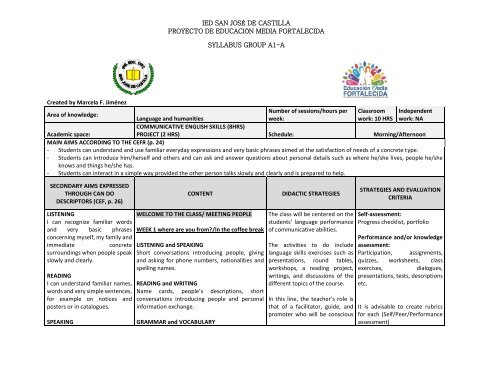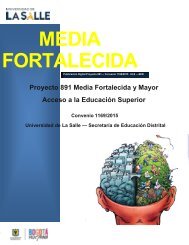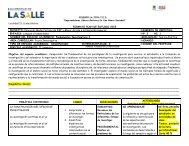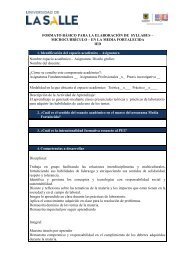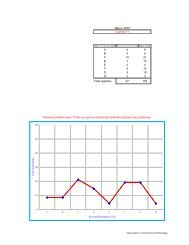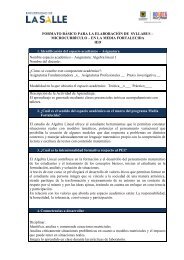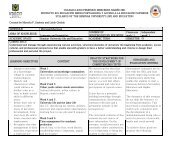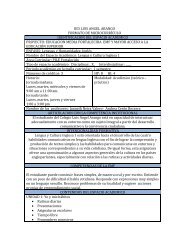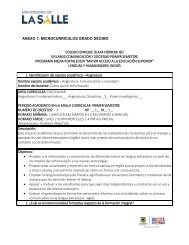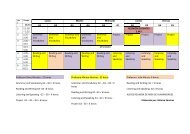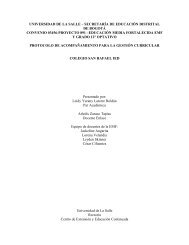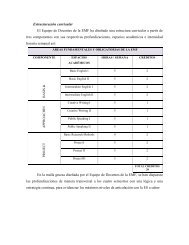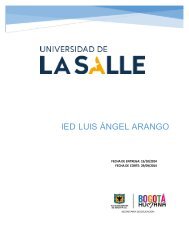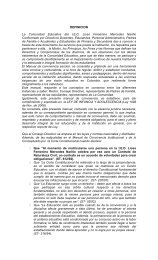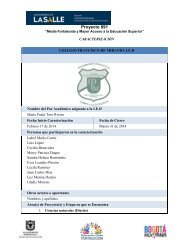1 - Syllabus castilla
Create successful ePaper yourself
Turn your PDF publications into a flip-book with our unique Google optimized e-Paper software.
IED SAN JOSÉ DE CASTILLA<br />
PROYECTO DE EDUCACIÓN MEDIA FORTALECIDA<br />
SYLLABUS GROUP A1-A<br />
Created by Marcela F. Jiménez<br />
Area of knowledge:<br />
Number of sessions/hours per<br />
week:<br />
Classroom<br />
work: 10 HRS<br />
Independent<br />
work: NA<br />
Language and humanities<br />
COMMUNICATIVE ENGLISH SKILLS (8HRS)<br />
PROJECT (2 HRS) Schedule: Morning/Afternoon<br />
Academic space:<br />
MAIN AIMS ACCORDING TO THE CEFR (p. 24)<br />
- Students can understand and use familiar everyday expressions and very basic phrases aimed at the satisfaction of needs of a concrete type.<br />
- Students can introduce him/herself and others and can ask and answer questions about personal details such as where he/she lives, people he/she<br />
knows and things he/she has.<br />
- Students can interact in a simple way provided the other person talks slowly and clearly and is prepared to help.<br />
SECONDARY AIMS EXPRESSED<br />
THROUGH CAN DO<br />
DESCRIPTORS (CEF, p. 26)<br />
CONTENT<br />
DIDACTIC STRATEGIES<br />
STRATEGIES AND EVALUATION<br />
CRITERIA<br />
LISTENING<br />
I can recognize familiar words<br />
and very basic phrases<br />
concerning myself, my family and<br />
immediate<br />
concrete<br />
surroundings when people speak<br />
slowly and clearly.<br />
READING<br />
I can understand familiar names,<br />
words and very simple sentences,<br />
for example on notices and<br />
posters or in catalogues.<br />
SPEAKING<br />
WELCOME TO THE CLASS/ MEETING PEOPLE<br />
WEEK 1 where are you from?/In the coffee break<br />
LISTENING and SPEAKING<br />
Short conversations introducing people, giving<br />
and asking for phone numbers, nationalities and<br />
spelling names.<br />
READING and WRITING<br />
Name cards, people’s descriptions, short<br />
conversations introducing people and personal<br />
information exchange.<br />
GRAMMAR and VOCABULARY<br />
The class will be centered on the<br />
students’ language performance<br />
of communicative abilities.<br />
The activities to do include<br />
language skills exercises such as<br />
presentations, round tables,<br />
workshops, a reading project,<br />
writings, and discussions of the<br />
different topics of the course.<br />
In this line, the teacher’s role is<br />
that of a facilitator, guide, and<br />
promoter who will be conscious<br />
Self-assessment:<br />
Progress checklist, portfolio<br />
Performance and/or knowledge<br />
assessment:<br />
Participation, assignments,<br />
quizzes, worksheets, class<br />
exercises,<br />
dialogues,<br />
presentations, tests, descriptions<br />
etc.<br />
It is advisable to create rubrics<br />
for each (Self/Peer/Performance<br />
assessment)
IED SAN JOSÉ DE CASTILLA<br />
PROYECTO DE EDUCACIÓN MEDIA FORTALECIDA<br />
SYLLABUS GROUP A1-A<br />
I can interact in a simple way<br />
provided the other person is<br />
prepared to repeat or rephrase<br />
things at a slower rate of speech<br />
and help me formulate what I'm<br />
trying to say. I can ask and<br />
answer simple questions in areas<br />
of immediate need or on very<br />
familiar topics.<br />
I can use simple phrases and<br />
sentences to describe where I<br />
live and people I know.<br />
WRITING<br />
I can write a short, simple<br />
postcard, for example sending<br />
holiday greetings. I can fill in<br />
forms with personal details, for<br />
example entering my name,<br />
nationality and address on a<br />
hotel registration form.<br />
GRAMMAR AND VOCABULARY<br />
I can use new vocabulary in<br />
personalised contexts. I can use<br />
the verb To be positive and<br />
negative, ask Wh- and Y/N<br />
questions, use subject pronouns,<br />
and possessive adjectives<br />
appropriately.<br />
To be positive and negative, Wh and Y/N<br />
questions, subject pronouns, possessive<br />
adjectives<br />
Colours, the alphabet, spelling, classroom<br />
instructions, classroom objects, numbers, jobs,<br />
countries and nationalities, use of a and an.<br />
WEEK 2 Personal details/Lost property<br />
LISTENING and SPEAKING<br />
Short conversations asking for personal details:<br />
phone number, nationality, age, e-mail, and<br />
address. Talking about personal possessions and<br />
different objects in the classroom.<br />
READING and WRITING<br />
Name cards, people’s descriptions, short<br />
conversations. Registration forms.<br />
GRAMMAR and VOCABULARY<br />
Wh- and Y/N questions, demonstratives, singular<br />
and plural nouns.<br />
Classroom objects, numbers, addresses.<br />
PEOPLE AND POSSESSIONS<br />
WEEK 3 What’s important to you?/ Meet the<br />
Robinsons<br />
of the achievements of the<br />
students’ language performance.<br />
Other activities may include<br />
- Group and pair work<br />
- Use of videos and recordings<br />
- Cooperative work based on<br />
specific situations.<br />
- Worksheets and workshops<br />
- Progress checklist<br />
- Conversations and surveys<br />
- Text / practice book, folder,<br />
notebook activities<br />
- Group presentations<br />
- Short pair interviews<br />
- Oral presentations
IED SAN JOSÉ DE CASTILLA<br />
PROYECTO DE EDUCACIÓN MEDIA FORTALECIDA<br />
SYLLABUS GROUP A1-A<br />
LISTENING and SPEAKING<br />
Short conversations asking for possessions. Family<br />
descriptions. Talking about personal possessions<br />
and the members of my family.<br />
READING and WRITING<br />
Descriptions of families and possessions people<br />
have and find important.<br />
GRAMMAR and VOCABULARY<br />
Question forms. Possessive ‘s. Short and long<br />
answers. Adjectives and their opposites. Word<br />
order of adjectives and the adverb very. Personal<br />
possessions. Have/has got.<br />
WEEK 4Time and money/ Where is the baby?<br />
LISTENING and SPEAKING<br />
Telling the time. Talking about the time and prices.<br />
Saying where things are in the house.<br />
READING and WRITING<br />
Simple descriptions about houses/flats.<br />
GRAMMAR and VOCABULARY<br />
Time words, prices, house vocabulary,<br />
prepositions of place.<br />
DAILY LIFE
IED SAN JOSÉ DE CASTILLA<br />
PROYECTO DE EDUCACIÓN MEDIA FORTALECIDA<br />
SYLLABUS GROUP A1-A<br />
WEEK 5 A glamorous life? Evenings and<br />
weekends<br />
LISTENING and SPEAKING<br />
Daily routines<br />
READING and WRITING<br />
Descriptions of daily routines.<br />
GRAMMAR and VOCABULARY<br />
Present simple + and -. Possessive adjectives and<br />
pronouns. Wh questions (I/you/we/they). Time<br />
phrases (at, in, on, every).<br />
WEEK 6 Special days/Early bird or night owl?<br />
LISTENING and SPEAKING<br />
Descriptions about habits including the frequency,<br />
times, places, dates etc.<br />
READING and WRITING<br />
People’s habits. Family life. Shor conversations<br />
about special dates.<br />
GRAMMAR and VOCABULARY<br />
Months, dates, phrases for special dates,<br />
frequency adverbs, subject and object pronouns,<br />
easy ways to make suggestions (let’s.., what<br />
about…?)<br />
TIME OFF
IED SAN JOSÉ DE CASTILLA<br />
PROYECTO DE EDUCACIÓN MEDIA FORTALECIDA<br />
SYLLABUS GROUP A1-A<br />
WEEK 7 Away from home/ First date!<br />
LISTENING AND SPEAKING<br />
Talking about likes and dislikes. Free time<br />
activities and hobbies.<br />
READING and WRITING<br />
Free time activities and hobbies. People’s likes<br />
and dislikes.<br />
GRAMMAR and VOCABULARY<br />
Free time activities. Present simple spelling rules<br />
(he/she/it). Present simple negative and<br />
interrogative (he/she/it).<br />
WEEK 8Eating out/ Breakfast time<br />
LISTENING and SPEAKING<br />
Conversation in a restaurant. Food facts in<br />
different cultures. Descriptions of what people eat<br />
at breakfast time.<br />
READING and WRITING<br />
Conversation in a restaurant. Short reports of food<br />
facts in different cultures. Descriptions of what<br />
people eat at breakfast time and/or other meals.<br />
GRAMMAR and VOCABULARY
IED SAN JOSÉ DE CASTILLA<br />
PROYECTO DE EDUCACIÓN MEDIA FORTALECIDA<br />
SYLLABUS GROUP A1-A<br />
Requests and offers, food, drinks, vegetables,<br />
fruits, dairy products etc. Countable and<br />
uncountable nouns.<br />
HOMES AND SHOPS<br />
WEEK 9My kind of place/Renting a flat<br />
LISTENING and SPEAKING<br />
Descriptions of towns, cities and the country.<br />
Descriptions of the different rooms in a flat or<br />
house.<br />
READING and WRITING<br />
Descriptions of towns, cities and the country.<br />
Descriptions of the different rooms in a flat or<br />
house.<br />
GRAMMAR and VOCABULARY<br />
There is/are. How much/many..? some, any, a.<br />
There/it/they. Places in a town. Rooms and things<br />
in a house.<br />
WEEK 10 At the shops/ In fashion<br />
LISTENING and SPEAKING<br />
Descriptions about things to shop, shopping<br />
centres, people’s likes when shopping.<br />
READING and WRITING
IED SAN JOSÉ DE CASTILLA<br />
PROYECTO DE EDUCACIÓN MEDIA FORTALECIDA<br />
SYLLABUS GROUP A1-A<br />
Descriptions about things to shop, shopping<br />
centres, people’s likes when shopping.<br />
GRAMMAR and VOCABULARY<br />
Shops, things to buy, shop language, clothes, and<br />
plural nouns.<br />
GOOD TIMES, BAD TIMES<br />
WEEK 11 Three generations/ People who<br />
changed the world<br />
LISTENING and SPEAKING<br />
People’s holidays. Facts about the world.<br />
Biographies of famous people.<br />
READING and WRITING<br />
People’s holidays. Facts about the world.<br />
Biographies of famous people.<br />
GRAMMAR and VOCABULARY<br />
Adjectives and their opposites, life events. Past<br />
simple regular and irregular verbs. Past simple<br />
Wh- questions.<br />
WEEK 12 FOUR WEEKENDS/THE GOOD AND THE<br />
BAD<br />
LISTENING and SPEAKING<br />
People’s descriptions of their weekend activities.<br />
Descriptions of last holidays, weekends, special
IED SAN JOSÉ DE CASTILLA<br />
PROYECTO DE EDUCACIÓN MEDIA FORTALECIDA<br />
SYLLABUS GROUP A1-A<br />
dates. Conversations on the same topics. Showing<br />
interest in a conversation.<br />
READING and WRITING<br />
People’s descriptions of their weekend activities.<br />
Descriptions of last holidays, weekends, special<br />
dates.<br />
GRAMMAR and VOCABULARY<br />
Weekend activities, adjectives with very, quite,<br />
really and too. Wh- questions in the past.<br />
WEEK 13 REVISION<br />
LISTENING and SPEAKING<br />
Listening to different people talk about their life in<br />
the past and what they do now. Conversations<br />
about last holidays and daily activities.<br />
READING and WRITING<br />
Descriptions of different people talking about<br />
their lives in the past and what they do now.<br />
Conversations about last holidays and daily<br />
activities, weekend activities etc.<br />
GRAMMAR and VOCABULARY<br />
Present simple, past simple, frequency adverbs,<br />
time expressions. Word order, question forms.<br />
WEEK 14 ASSESSMENT
IED SAN JOSÉ DE CASTILLA<br />
PROYECTO DE EDUCACIÓN MEDIA FORTALECIDA<br />
SYLLABUS GROUP A1-A<br />
WEEK 15 ACADEMIC SUPPORT WEEK/<br />
PROGRAMME<br />
WEEK 16 PLACEMENT TEST<br />
PROJECT: BEING A TOURIST<br />
AIMS CONTENT DIDACTIC STRATEGIES<br />
STRATEGIES AND EVALUATION<br />
CRITERIA<br />
During both the process and at<br />
the end of the project it is<br />
expected that learner will<br />
develop intellectual, physical,<br />
motor, social skills. Also the<br />
different activities will allow<br />
emotional and personal<br />
development.<br />
The project will help learners<br />
make choices, take responsibility<br />
and develop feelings of<br />
ownership and self-awareness.<br />
Learners will also improve the<br />
use of the language learnt in the<br />
component Communicative Skills<br />
PROJECT:<br />
BEING A TOURIST<br />
Through this project learners will have the<br />
opportunity to be tourists and local people in<br />
a tourist area. Some of them will have the<br />
chance to make reservations, buy travel<br />
tickets, order food, find their way around the<br />
airport or terminal, buy souvenirs, and ask for<br />
advice when travelling. Others will be the<br />
local people selling traditional objects,<br />
tickets, giving information, assisting people<br />
etc. Students are expected to present a skit,<br />
use props, decorate the setting accordingly,<br />
make good use of the language, vocabulary<br />
and expressions learnt depending on the<br />
context.<br />
ACTIVITY 1: PRESENTING THE PROJECT<br />
The activities to do include<br />
language-skill exercises as well as<br />
those related to the development<br />
of social and personal ones.<br />
Students face challenges that help<br />
them develop research skills,<br />
ability to argue, interpret and<br />
discuss about different real-life like<br />
situations.<br />
Students identify research<br />
problems; structure short texts of<br />
different types; and seek answers<br />
from specific findings.<br />
Besides, they are expected to carry<br />
out interviews, surveys, collect<br />
It is important to allocate time for<br />
the evaluation of both the process<br />
(the doing) and the product (the<br />
tangible results).<br />
Ongoing evaluation raises the<br />
students’ awareness of how they<br />
learn and is part of the process of<br />
helping them become more<br />
independent learners.<br />
If necessary encourage the use of a<br />
Project diary or log that way<br />
learners can keep track of what they<br />
have achieved. Another strategy<br />
may be to have a checklist of<br />
objectives to be ticked off as the<br />
Project progresses.
IED SAN JOSÉ DE CASTILLA<br />
PROYECTO DE EDUCACIÓN MEDIA FORTALECIDA<br />
SYLLABUS GROUP A1-A<br />
as well as develop research<br />
abilities.<br />
The teacher presents the project, gives<br />
general guidelines and informs the learners<br />
about the end-product, times, dates etc. If<br />
possible provides learners with a session-tosession<br />
schedule.<br />
ACTIVITY 2: On the phone<br />
Learners watch a video, listen to a recording<br />
or read a conversation about hotel and/or<br />
restaurant reservations.<br />
ACTIVITY 3: Types of restaurants<br />
Leaners get familiar with vocabulary related<br />
to food, restaurants etc and practice it<br />
through a conversation.<br />
ACTIVITY 4: At the airport or terminal<br />
Learners find their way around the airport or<br />
terminal, buy tickets, ask for and give<br />
information.<br />
ACTIVITY 5: ASSESSMENT WEEK<br />
ACTIVITY 6: Travelling<br />
Learners talk about different means of<br />
transport, cost, duration of journeys,<br />
advantages and disadvantages of each.<br />
ACTIVITY 7: How much does it cost?<br />
Learners practice numbers, ask for and give<br />
information about prices in different shops.<br />
ACTIVITY 10: Giving warning<br />
They also ask for and give advice to travellers.<br />
ACTIVITY 13: END-PRODUCT PRESENTATION<br />
data and organize it in such a way<br />
that can be used to achieve the<br />
overall aim of the project.<br />
Self-assessment:<br />
Progress checklist, portfolio<br />
Performance and/or knowledge<br />
assessment:<br />
Participation, assignments,<br />
presentations, class activities, Endproduct<br />
etc.<br />
Peer assessment<br />
Rubric
IED SAN JOSÉ DE CASTILLA<br />
PROYECTO DE EDUCACIÓN MEDIA FORTALECIDA<br />
SYLLABUS GROUP A1-A<br />
Learners present their skit in front of the class<br />
making sure the setting corresponds to the<br />
situation.<br />
ACTIVITY 14: ASSESSMENT WEEK<br />
References<br />
Evans, Virginia, et al. Career Paths Tourism. Express Publishing. 2011<br />
Phillips, Diane, Sarah Burwood, and Helen Dunford. Projects with young learners. Oxford University Press, 1999.<br />
Redston, Chris, and Gillie Cunningham. Face2face Elementary Student's Book. Cambridge University Press. 2005.<br />
Verhelst, N., et al. Common European Framework of Reference for Languages: learning, teaching, assessment. Cambridge University Press, 2009.


